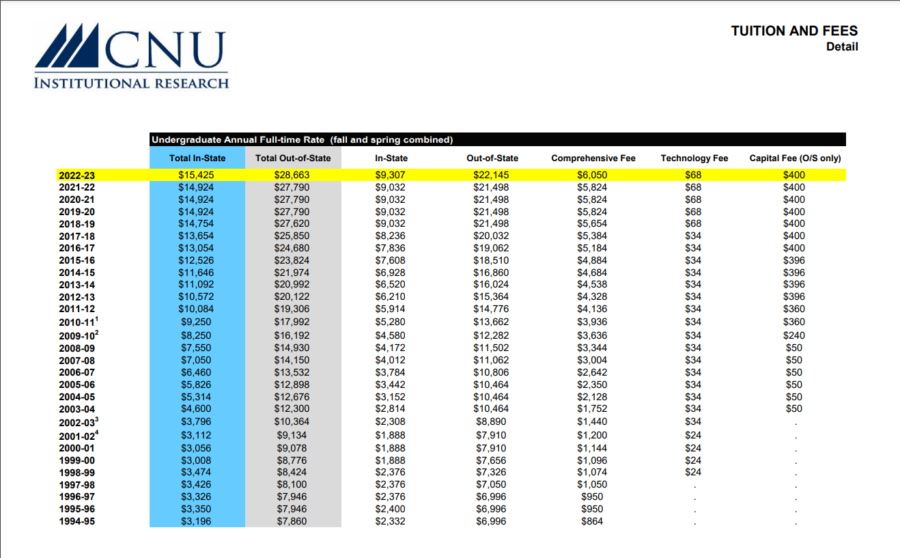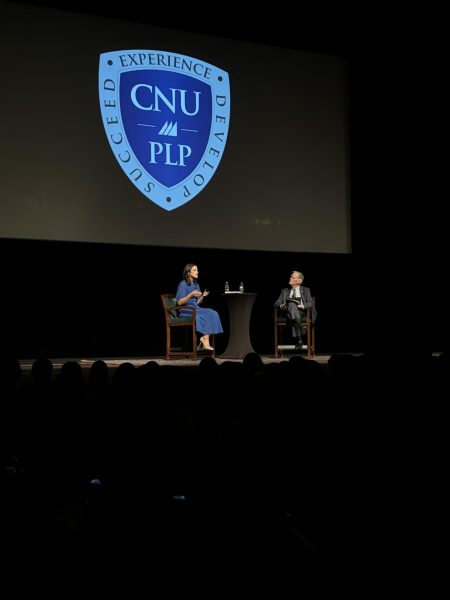Recap of Public Comment Hearing on Proposed Tuition and Fees
On March 16 CNU’s Board of Visitors held a public comment hearing on the university’s tuition and fees budget for the upcoming year. The Board of Visitors sets the tuition and fees and will meet in the coming month for the 2023-2024 budget.
Although the Board of Visitors made the public comment portion of the meeting available to anyone who registered to speak, no one came forward to address the Board with comments. The Board of Visitors spent most of the meeting going over money allocation and changes in funding for the university.
The university receives spending money from two places, with about 30% coming from state tax dollars as CNU is a public university. The other 70% comes from tuition, fees, gifts, grants and more.
This money goes to 4 major avenues. First is Education and General which takes 51% of the money. The next is Auxiliary Enterprises which comprises housing, dining, counseling, athletics and more which takes 41% of the budget. 7% is used for student financial assistance and 1% is used for sponsored research.
The meeting then went over the in-state tuition and fees cost for Christopher Newport. It was $14,754 in 2018-2019, 14,924 in 2019-2020, 2020-2021 and 2021-2022. In 2022-2023 it was $15,425 however students would receive $275 dollars back. Thus tuition was actually the same as previous years but the fees went up slightly.
CNU was the 6th most expensive in-state university for total cost for the 2022-2023 school year at $27,415. In addition, they were 11th for out of state total cost at $40,653.
There were two years of state mandated 5% pay raises. Along with three years of minimum wage increases going from $7.25 to $12.00 an hour. There were inflationary increases, especially in utilities. There were enrollment adjustments, meaning smaller freshman classes, along with a one time covid funding. This covid fund was a one time occurance in which CNU received money from state and federal levels to help offset costs that were negatively impacted by COVID. This included money from a federal grant that would help provide financial aid to students for unexpected expenses due to the pandemic.
The Board of Visitors suggested that there could be an increase in tuition from $0.00 to $793.00 (0%-8.5%). There could also be an increase in the comprehensive fee from $0.00-$300.00 (0%-5%) and a possible increase in the technology fee from $0.00 to $170.00 (0%-250%).
They also discussed a recommended Music fee increase by $125 to bring it to $350 a lesson, and a recommended laboratory fee increase from $25 to $75. The third recommendation is to increase the arts laboratory fee by $25 to $75.
The Luter school of Business needs about $600,000 to help address different needs for it to be able to function and run efficiently. These needs range from doing more outreach with business connections to classroom technology and more.
There will be about $6.2 million in costs that CNU has to account for next year that they will have to pay. For instance they need to cover the loss of $1.5 million in federal stimulus funds and account for an increase in utilities which is estimated at $0.4 million. CNU needs to account for these two expenses plus additional cost drivers next year. They have ways to account for up to $3.3 million of that, but there will have to be decisions made about how to deal with the rest of the $6.2 million.
The board will meet on April 14 where they will determine the tuition and fees for next year. Though, as Amie Dale, Secretary to the Board of Visitors noted in an email to the CNU community, the final tuition and fee decision is dependent on the state’s final budget.
Your donation will support the student journalists of Christopher Newport University. Your contribution will allow us to purchase equipment and cover our annual website hosting costs.






